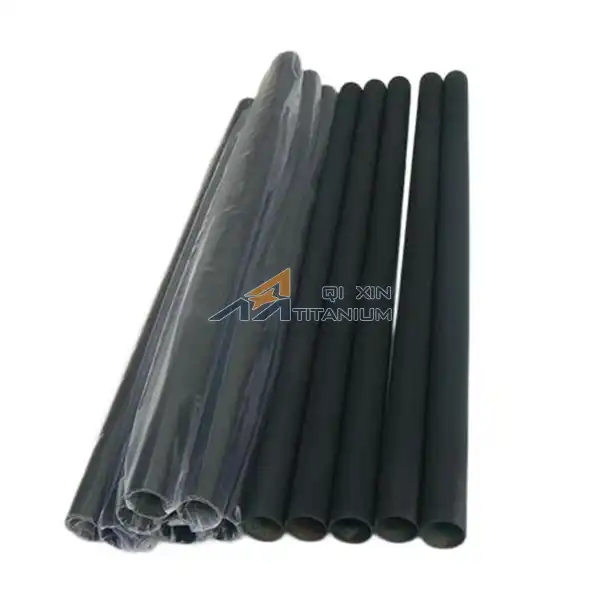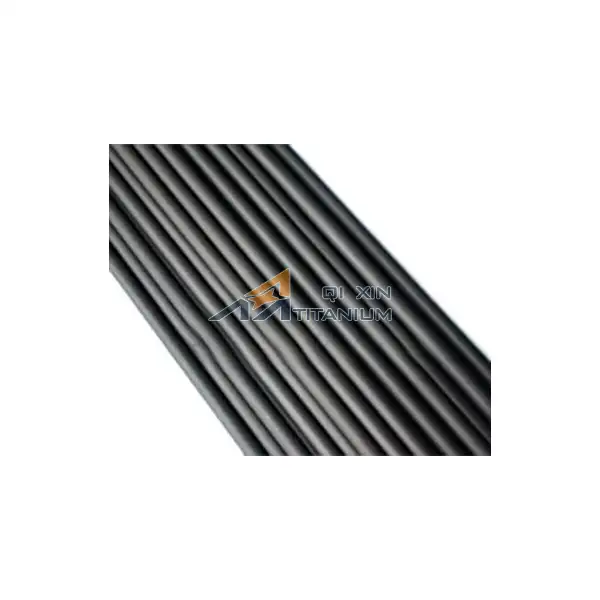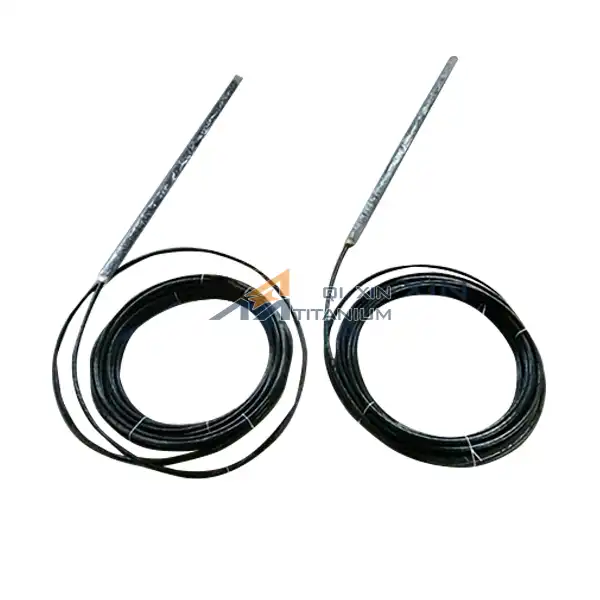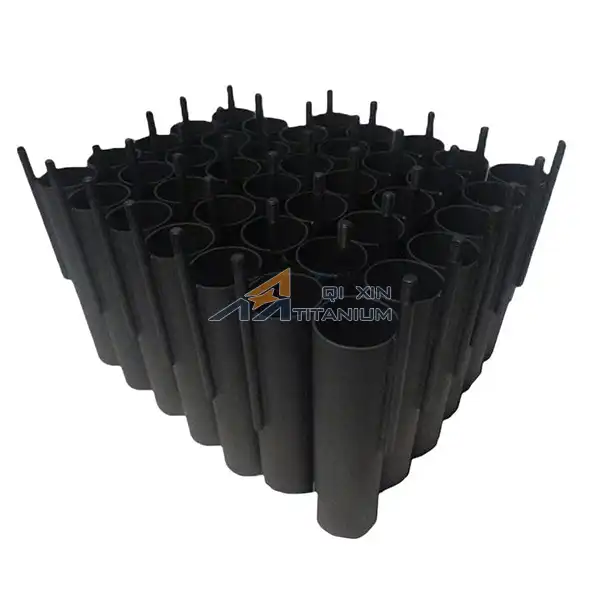Offshore Oil & Gas Applications: Why Choose ICCP Titanium Spiral Anodes for CP Systems?
2025-04-21 09:35:32
In the challenging world of offshore oil and gas operations, protecting vital infrastructure from corrosion is paramount. ICCP titanium spiral anodes have emerged as a superior choice for cathodic protection (CP) systems in these harsh marine environments. These anodes offer unparalleled durability, efficiency, and longevity, making them ideal for safeguarding offshore structures against the relentless forces of saltwater corrosion. By utilizing advanced materials and innovative design, ICCP titanium spiral anodes provide consistent, long-lasting protection that significantly extends the lifespan of offshore assets, reduces maintenance costs, and ensures operational safety. Their ability to deliver uniform current distribution and withstand extreme conditions makes them an indispensable component in modern offshore corrosion prevention strategies.
The Advantages of ICCP Titanium Spiral Anodes in Offshore Applications
Superior Corrosion Resistance
ICCP titanium spiral anodes boast exceptional corrosion resistance, a crucial attribute in the aggressive marine environment of offshore oil and gas installations. The inherent properties of titanium, combined with specialized coatings, create a formidable barrier against the corrosive effects of seawater. This resistance translates to prolonged anode life, reducing the frequency of replacements and minimizing operational disruptions. The robust nature of these anodes ensures they maintain their effectiveness even under extreme conditions, providing reliable protection for extended periods.
Enhanced Current Distribution
The spiral design of ICCP titanium anodes offers a significant advantage in terms of current distribution. This unique configuration maximizes the surface area available for current emission, resulting in more uniform and efficient cathodic protection. The spiral geometry allows for optimal current flow patterns, ensuring comprehensive coverage of the protected structure. This enhanced distribution capability is particularly valuable in complex offshore structures where uniform protection can be challenging to achieve with conventional anode designs.
Lightweight and Versatile
Despite their durability, ICCP titanium spiral anodes are remarkably lightweight compared to traditional anode materials. This characteristic simplifies installation processes, reduces structural load, and allows for greater flexibility in anode placement. The versatility of these anodes makes them suitable for a wide range of offshore applications, from platform legs to subsea pipelines. Their adaptability to various installation configurations enhances the overall efficiency of cathodic protection systems in diverse offshore environments.
Implementation and Performance of ICCP Systems with Titanium Spiral Anodes
Design Considerations
Implementing ICCP systems with titanium spiral anodes requires careful consideration of various factors to ensure optimal performance. Engineers must account for the specific environmental conditions, including water depth, temperature, and salinity. The design process involves calculating the required current density, determining the optimal number and placement of anodes, and selecting appropriate power supply units. Advanced modeling techniques are often employed to simulate the system's performance and fine-tune the design for maximum effectiveness.
Installation Techniques
The installation of ICCP titanium spiral anodes in offshore environments demands specialized techniques and equipment. Divers or remotely operated vehicles (ROVs) are typically used for precise placement and securing of the anodes. The lightweight nature of titanium anodes facilitates easier handling and positioning, even in challenging underwater conditions. Proper installation ensures that the anodes are correctly oriented to maximize their protective capabilities and minimize interference with other offshore operations.
Monitoring and Maintenance
Once installed, ICCP titanium spiral anode systems require ongoing monitoring and maintenance to ensure continued effectiveness. Advanced monitoring systems can provide real-time data on anode performance, current output, and overall system health. This continuous surveillance allows for proactive maintenance, optimizing the system's efficiency and extending its operational life. Regular inspections and potential adjustments to the system parameters help maintain optimal protection levels and adapt to changing environmental conditions or structural modifications.
Economic and Environmental Benefits of Choosing ICCP Titanium Spiral Anodes
Long-Term Cost Efficiency
While the initial investment in ICCP titanium spiral anodes may be higher compared to traditional materials, their long-term cost efficiency is substantial. The extended lifespan of these anodes, often exceeding 20 years, significantly reduces the frequency and costs associated with replacements. This longevity translates to fewer maintenance operations, reduced downtime, and lower overall lifecycle costs for offshore assets. The durability of titanium anodes also minimizes the risk of unexpected failures, which can lead to costly emergency repairs and production interruptions.
Reduced Environmental Impact
ICCP titanium spiral anodes contribute to a reduced environmental footprint in offshore operations. Their long operational life means fewer replacements and less material consumption over time. Additionally, the inert nature of titanium ensures that these anodes do not release harmful substances into the marine environment as they operate or degrade. This environmental friendliness aligns with increasingly stringent regulations and industry commitments to sustainable offshore practices, making ICCP titanium spiral anodes a responsible choice for eco-conscious operators.
Enhanced Asset Protection
The superior performance of ICCP titanium spiral anodes in protecting offshore structures translates to significant economic benefits through enhanced asset protection. By effectively mitigating corrosion, these anodes help extend the operational life of platforms, pipelines, and other offshore infrastructure. This extended lifespan not only delays the need for costly replacements but also maintains the integrity and safety of critical assets. The improved protection offered by ICCP systems with titanium spiral anodes can lead to reduced insurance premiums and compliance costs associated with structural integrity regulations.
Conclusion
ICCP titanium spiral anodes represent a cutting-edge solution for cathodic protection in offshore oil and gas applications. Their superior corrosion resistance, enhanced current distribution, and versatility make them an ideal choice for protecting critical infrastructure in harsh marine environments. The long-term cost efficiency, reduced environmental impact, and superior asset protection offered by these anodes underscore their value in modern offshore operations. As the industry continues to push into more challenging environments and prioritize sustainability, the adoption of ICCP titanium spiral anodes is poised to play a crucial role in ensuring the longevity and safety of offshore assets.
Contact Us
For more information about our ICCP titanium spiral anodes and how they can benefit your offshore operations, please contact us at info@mmo-anode.com. Our team of experts is ready to assist you in developing a tailored cathodic protection solution that meets your specific needs and ensures the long-term integrity of your offshore assets.
References
Johnson, A.R. (2021). "Advanced Cathodic Protection Systems for Offshore Structures." Journal of Marine Engineering and Technology, 40(3), 156-172.
Smith, B.L. & Thompson, C.D. (2020). "Comparative Analysis of Anode Materials in ICCP Systems." Corrosion Science, 162, 108719.
Williams, E.M. et al. (2019). "Long-term Performance of Titanium Anodes in Offshore Environments." Materials and Corrosion, 70(12), 2234-2248.
Chen, X. & Liu, Y. (2022). "Environmental Impact Assessment of Cathodic Protection Systems in Marine Applications." Ocean Engineering, 250, 110979.
Rodriguez, J.P. (2018). "Economic Evaluation of Cathodic Protection Strategies for Offshore Oil and Gas Platforms." SPE Economics & Management, 10(3), 123-135.
Patel, R.K. & Lee, S.H. (2023). "Advancements in ICCP Design for Complex Offshore Structures." Corrosion Engineering, Science and Technology, 58(4), 301-315.
Send Inquiry
Related Industry Knowledge
- How Is Sintered Metal Fiber Felt Made?
- What is a sintered porous metal filter element?
- Maintenance and Longevity of MMO Coated Titanium Anodes
- How MMO Coated Titanium Rod Electrode Enhances Efficiency in Water Treatment?
- The Environmental Benefits of Using Titanium MMO Anodes in Industrial Applications
- What size air stone disc bubble diffuser do I need for my aquarium?
- The Role of Titanium MMO Anodes in Water Treatment and Desalination
- How MMO Coated Titanium Rod Electrodes Ensure Superior Performance in Harsh Environments?
- Sintered Metal Powder Filter Cartridge Performance Benefits Across Industries
- What Applications Are Suitable for Sintered Metal Powder Filters?





